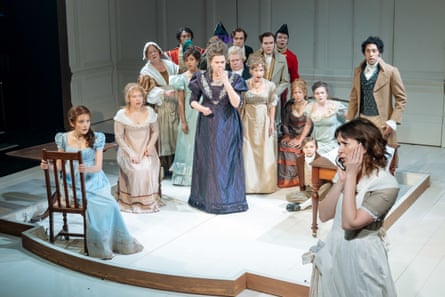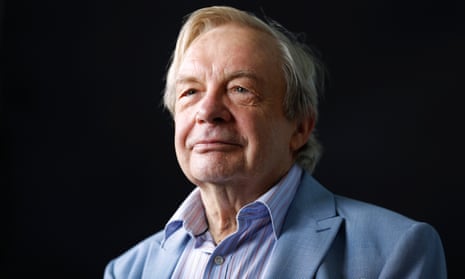Tom Stoppard: In the theatre, Michael is simply “Billington”, like a brand. Four stars from Billington is a relief and a blessing; a single star is as rare as five. Actually rarer. After so many reviews and so many years, I doubt Michael ever enters a theatre pessimistically. How could he keep going for so long if he didn’t expect to be blown away every time? When he can’t like something as much as he’d like to like it, he often writes “Much as I admire…” before he dissents. A curate’s egg never got a fairer deal. Not very long after Michael took over, Kenneth Tynan asked me, “Who is the critic now?” then answered his own question tentatively: “Michael Billington?” I didn’t have a better answer.
Laura Wade: Playwrights aren’t supposed to care about reviews. I do care – I can’t help being interested – and the one I care about most is Michael’s. He brings a sense of history, vast knowledge and unmatched experience. Is there anyone writing now who has seen more plays? It matters to Michael that our work is both theatrically and politically rigorous, and mentally and visually stimulating. He holds us to account. And when he really gets what you’re trying to do – as he did with my most recent play, The Watsons – it’s the best feeling. It galvanises you. His love for the theatre and his belief that plays can be a catalyst for change and a force for good make him a humane and timely reminder of the value of experts.

Harriet Walter: My first mention in a Billington review was in 1970 when I was a pre-drama school usher at Ed Berman’s Ambiance Lunch Hour theatre. We were roped in to chat to the audience and invite them for a spin on the dancefloor. We had our names on our lapels and I unwittingly selected Michael B as my partner. His review said something like: “It isn’t every day one enters a theatre to be swept on to a dancefloor by an usherette called Harriet.” Little did either of us know that he would be reviewing my acting for the next 50 years. Michael would venture where other critics feared to tread. In my early years on the political fringe, he would turn up at some shabby little venue miles out of London on a rainy Tuesday and honour us with a review. That dedication and breadth of perspective have stayed with him.
Peter Brook: A good critic has an eye like a scanner, an ear like a composer, the tongue that enjoys sweet and sour, a razor-like intelligence and a deeply tender heart. Michael has all of these, and I will miss reading all he writes.
Atiha Sen Gupta: I first crossed paths with Michael in 2009 when my debut play, What Fatima Did, about a young woman who adopts the hijab on the eve of her 18th birthday, was produced at Hampstead theatre. The much-feared and much-feted “Billington review” came out, and the cast and crew breathed a proverbial sigh of relief: Michael’s thoughts on the piece were generally positive. I was glad he had seen something in the play as it was full of loud, angry, brown kids and quite a lot of swearing – a far cry from what usually graced the main stage at Hampstead. Although sharp, Michael has a generosity that seeks out the best in people’s work. His review of my play ended with the words, “This is the work of a writer with a future” – which I then proceeded to reproduce on everything (I’ll admit, it was a bit much on birthday cards). After 48 years and 10,000 reviews, Michael can retire in the knowledge that he is a critic with a past – and an illustrious one at that.

Sonia Friedman: Michael has been a powerful, trustworthy voice throughout my entire career. He can condense a show into 400 words, carrying its argument and catching its tone, in a way that few critics can. Some British reviews these days feel fluffy or a bit flip. His never do, even after all this time. They’re robust, informative, even-handed. They spread credit around casts and creative teams. They always summon (and justify) an opinion – and that’s easier said than done night after night, show after show. Most of all, Michael makes a case for theatre as something that matters, be it Ken Dodd or King Lear. There’s a gruelling quality to criticism, turning up every night to whatever happens to be opening – panto to political theatre – and turning out copy day after day, to deadline. Doing so for half a century requires extraordinary discipline, honesty, faith in artists and in art and, really, a generosity of spirit. Michael marries intellectual self-assurance with emotional humility. I suspect he will be the last of his kind in the changing face of the media and our industry will be the poorer for his departure but I hope future critics will be inspired by his dedication and enthusiasm.
Patrick Stewart: When I was 15 and worked for the Dewsbury and District Reporter, the subeditor, Charlie Pickles, told me that if I wanted to understand what good, independent journalism was, I should read the Guardian. Charlie was right then and he still is. At 15, I was bitten by the acting bug and was given, after a year in the reporters’ room, an ultimatum by the editor, Henry Wilson. One night, there was a mill fire in my home town, Mirfield. Charlie had told the editor: “No need to send anyone, Patrick is next door at a council meeting.” I wasn’t. I was at a rehearsal with the Mirfield drama club and had planned to phone in for the council meeting report, but had been outed. Next morning, I was summoned to the editor’s office and told: give up this stupid acting and do your job or get off my paper. I closed up my ancient typewriter, while my closest friend, Barry Parkin, urged me: “You are a secondary modern schoolboy, Patrick, you’ll never get a job again as good as this.” It has turned out he might have been wrong.
From that day, the Guardian became the only newspaper for me – and when Michael took the post of theatre critic in 1971, it became clear to me that, as long as he was writing, this would be my paper. His skills were so quickly evident: a great knowledge of drama, an understanding of the roles of director and, especially, actor and, most significant for me, a complete understanding of what the Royal Shakespeare Company stood for. I can’t remember when he first gave me a mention but it might have been when I played Launce in Robin Phillips’s production of The Two Gentlemen of Verona alongside the tremendous Ian Richardson and the then little-known Helen Mirren. Most importantly his love of the theatre was evident in every review. He will be missed.

Joe Penhall: I began reading Michael’s reviews just before I became a playwright. He gave the impression playwriting was an honourable, thrilling, important occupation. It was a discourse that could banish the boredom of ordinary life. It seemed like a conversation I wanted involvement in. When he reviewed my debut play at the Royal Court Upstairs it was terse and to the point, not quite a rave. “The Court has discovered a good writer.” I liked the abstemiousness of it. Other plays of mine that were slated by almost everyone else, he unexcitingly praised for their “generosity” or “compassion”, assessments I probably benefited from but didn’t savour. He understood my work better than most and only once did I tear my hair out – when he damned a play with faint praise while fretting: “I just worry that it will give succour to rightwing opponents of nationalised healthcare.” A typically utilitarian cavil which seemed a tad overripe at the time but with which I vaguely agree now. Like fine wine, his reviews took time to mature.
He isn’t afraid to like a play that nobody else likes and vice versa. If a play was going down badly, one would always wait for Billington’s review before one slashed one’s wrists. If a play opened with a brace of raves, he would occasionally bring one down to earth. Nevertheless, no matter what happened on opening night, one usually respected Michael in the morning. I made it my business to never meet him, although we were introduced once. I’d got it into my head that a playwright should never meet critics and I slightly regret that now. Because I admired his respectfulness, his incisive intellect, his thoughtfulness, his extraordinary work ethic and, indeed, his considerable generosity and compassion. I loved the fact he would travel to the four corners of the earth to review theatre with the same relish and insight that he brought to homegrown work. He was influential in a way that few critics will be in the future – sometimes annoyingly so. He liked a certain kind of play (who doesn’t?) but in later years he embraced eclecticism and breathed new life into his writing. Like the Rolling Stones he never stopped working. Now that time has come, he will be greatly missed – but at least I’m allowed to meet him now. I’m giving him four stars. The Guardian discovered a good writer…
Alan Ayckbourn: I’ve been writing professionally for 60 years and, for a considerable period of that time, Michael has been there encouraging, noting the development as my work gradually matured in style and shifted in focus. Throughout he wrote with an amazing sensitivity, empathy and understanding for which I shall always be grateful. His fair, balanced, intelligent reviews were driven by the love and enthusiasm he had for his job. In short, a critic with a genuine passion for theatre – which, speaking from a lifetime of experience, is far rarer than it sounds. Thank you, Michael, you are special. We shall miss you.
Michael Billington will be talking to Arifa Akbar in a Guardian Live event at Kings Place, London, on 3 February.
